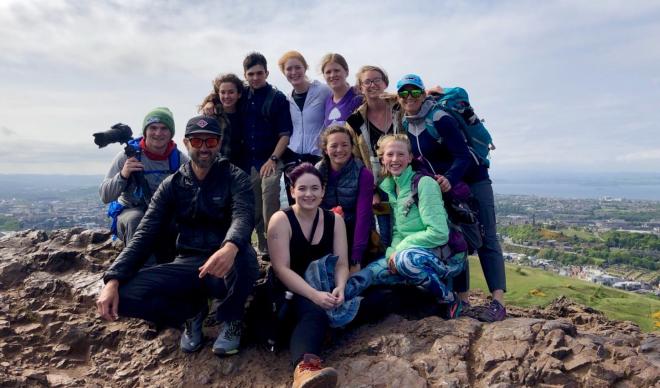
College of Idaho junior history major Julia Phelps was used to her group straying from the beaten path – the Scottish Highlands are known for their rugged, challenging mountains, after all. But as she and the other eight College of Idaho study abroad students began to climb the steepest part of Na Gruagaichean, she admitted feeling a bit anxious.
“I kept telling myself that they knew what they were doing,” Phelps said about the group’s faculty leaders, C of I English and Environmental Studies Professor Scott Knickerbocker and Geoscience Professor Jaime Goode. “We were walking through this really spongey material and I kept thinking ‘when does this end?’”
When the group safely made it to the top of the peak and Phelps looked over the Scottish countryside, she felt exhilaration as well as pride.
“I just had this overwhelming sense of being in this beautiful place,” Phelps said. “It felt like I was part of something bigger than myself.”
Experiences like these happened almost daily for the C of I group during its three-week study abroad trip led by Knickerbocker and Goode: “Reading the Mountains,” a class open to students of all majors and minors that examines the country through an interdisciplinary lens of natural history, geology, literature and creative nonfiction writing.
“We followed the idea of the earth itself as text,” Knickerbocker said. “The mountains themselves offer ways to peer into ‘the great abyss of time’ – it’s a scale so vast that it dwarfs humanity.”
Knickerbocker and Goode designed the course as a liberal arts exploration of the region, and their group took the title of the course both literally and figuratively, exploring the mountains through literature by writers like John Muir, Robert Macfarlane, and Nan Shepherd, while also closely observing the region’s geology itself, which includes several dormant volcanoes.
“Scotland has every type of landscape you can imagine,” Goode said. “You could say that Scotland’s history can be best read through the rock formations we can observe.”
The students attended a preparation course the semester before the trip, which left the Monday following the 2018 Commencement ceremony. While some students signed up for the course with a focus in environmental studies, many students were neither a major nor a minor in the English or environmental studies programs, like junior biology major Lindy Westendorf.
“I’ve just always really wanted to visit Scotland and take a trip out of the country,” Westendorf said. “Even though I didn’t have much experience in geology, I really wanted to travel and see what was out there.”
Sophomore environmental studies major Ian Meyer recalled his first thoughts of wonder and excitement upon landing in Edinburgh, where they spent the first few days of their trip.
“It didn’t seem real at first,” Meyer said. “Being in a different place, you see everything in a different lens. It really hits you all at once that you’re not home anymore.”
After exploring Edinburgh for a time, the students embarked on an adventure through the Scottish Highlands, visiting regions like Glen Coe, Glen Nevis, the Cairngorms, the Isle of Skye, and a variety of lochs. Along the way, the students kept extensive journals, writing and sharing their creative nonfiction as well as recording technical observations about the surrounding geology.
“Working in small groups like that in such unique places, it made everything feel much deeper,” Westendorf said. “I think it made all of the students get more actively involved in every aspect of the trip, including all the stuff we were learning.”
Knickerbocker said the academic focus would be useful across all the students’ areas of study, particularly the thorough written observations.
“We want them to pay deep attention to both word and world,” Knickerbocker said. “Close observation and the ability to think critically in different environments are transferable skills that they can bring to the rest of their college experience and beyond.”
However, he said the unplanned lessons they learned as part of the traveling experience would be just as valuable and memorable. Working together in small groups and learning to appreciate each other’s similarities and differences would prove to create special memories on their own. Meyer recalled learning to skip rocks with Goode and bonding with Knickerbocker over a shared taste for the alternative rock band The Pixies, while Westendorf remembered swimming in the cold lochs with the rest of the group.
“I didn’t know anyone in our group super well when I first signed up for the course,” Westendorf said. “After spending all that time together, I still love talking to everyone that I went with, because we’ll always have what we shared in Scotland.”
Meyer said all C of I students should look into a study abroad experience of their own at least one semester before they graduate.
“There’s always a way to make it happen, whatever you want to study,” Meyer said. “The experiences you have may be unexpected, but you’ll never imagine what you can learn until you get there, and what you get is what you’ll remember forever.”
To learn more about study abroad opportunities at The College of Idaho, click here.

